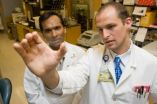(Press-News.org) BC Children's Hospital and University of British Columbia (UBC) researchers have found that two existing screening tests are accurate in diagnosing development delays in children and could be incorporated in a busy family practice setting with relative ease.
Parents can complete the Ages and Stages Questionnaire (ASQ) or the Parents' Evaluation of Developmental Status (PEDS) at home or in the family physician's office, with the physician scoring the tests and providing results in a matter of minutes.
"Only 30 per cent of children with developmental delays are identified prior to school age – whether that's social, physical or learning – and most experts would agree that we should be identifying those delays earlier through regular screening," says Dr. Marjolaine Limbos, principal investigator and a psychologist at BC Children's Hospital, an agency of the Provincial Health Services Authority.
However, researchers believe the tests aren't routinely administered by Canadian family physicians because they haven't been validated (tested for accuracy) in a primary care setting (physician's office) and because of physicians' concerns about having enough time to administer such tests in a busy practice.
"Right now, the majority of family physicians do the eyeball test," says co-author Dr. David Joyce, a clinical assistant professor in UBC's Department of Family Practice and a Vancouver family physician. "But research shows that is not very accurate, and kids are falling through the cracks. It's critical to catch and treat disabilities early because the longer you leave them, the more intractable they become. The brain becomes more hard-wired, and opportunities for change become narrower."
The results were published recently in the online version of the Journal of Developmental & Behavioral Pediatrics, a leading resource for clinicians, teachers, and researchers involved in pediatric healthcare.
Researchers recruited 334 children between the ages of one and five years old. Families were recruited from more than 80 physician offices in Ontario. The parents completed both the PEDS and the ASQ tests, and children underwent a full battery of psychological testing to serve as a comparison or gold standard. While both tests had reasonable accuracy in picking up abnormalities, the PEDS had a slightly lower accuracy than the ASQ.
The PEDS, the shorter of the two tests, takes five minutes to complete and is based on a parent's recollection of their child's abilities, with yes or no responses. The ASQ is a longer test, taking about 15 minutes, and asks parents about their child's ability to perform certain activities, such as throwing a ball to test motor skills. Both the sensitivity and specificity of the ASQ in identifying developmental delays was higher.
"Our research shows that overall, the ASQ and, to a lesser extent, the PEDS are accurate and can be administered effectively and at low cost," says Dr. Limbos. "The study results will hopefully provide physicians with the confidence that the tests can be incorporated into a busy physician practice with relatively little demand on staff time, with the results being easy to interpret and validate."
Children who are identified as having a developmental disability through the screening tests would then be referred to a specialist for further testing and treatment.
The findings are a part of a larger study the researchers are conducting to examine the accuracy of screening tests used in primary care and the factors related to physician screening for developmental delay.
### END
B.C. researchers find quick, low-cost tests can accurately identify childhood developmental delays
Study confirms accuracy of developmental screening tests that can be administered by family physicians
2011-08-04
ELSE PRESS RELEASES FROM THIS DATE:
Urine test shows prostate cancer risk, U-M study finds
2011-08-04
ANN ARBOR, Mich. — A new urine test can help aid early detection of and treatment decisions about prostate cancer, a study from the University of Michigan Comprehensive Cancer Center and the Michigan Center for Translational Pathology finds.
The test supplements an elevated prostate specific antigen, or PSA, screening result, and could help some men delay or avoid a needle biopsy while pointing out men at highest risk for clinically significant prostate cancer.
The test looks for a genetic anomaly that occurs in about half of all prostate cancers, an instance of two ...
6 million years of savanna
2011-08-04
SALT LAKE CITY, Aug. 3, 2011 – University of Utah scientists used chemical isotopes in ancient soil to measure prehistoric tree cover – in effect, shade – and found that grassy, tree-dotted savannas prevailed at most East African sites where human ancestors and their ape relatives evolved during the past 6 million years.
"We've been able to quantify how much shade was available in the geological past," says geochemist Thure Cerling, senior author of a study of the new method in the Thursday, Aug. 4, 2011 issue of the journal Nature. "And it shows there have been open ...
What steers vampires to blood
2011-08-04
Scientists have known for years that when vampire bats tear through an animal's skin with their razor-sharp teeth, their noses guide them to the best spots – where a precise bite will strike a vein and spill forth nourishing blood. But nobody knew exactly how bats knew where to bite.
By investigating wild vampire bats in South America, researchers at the University of California, San Francisco and Instituto Venezolano de Investigaciones Científicas in Caracas, Venezuela have discovered their secret: a sensitive, heat-detecting molecule covering nerve endings on their ...
Unconventional hunt for new cancer targets leads to a powerful drug candidate for leukemia
2011-08-04
Cold Spring Harbor, N.Y. – Scientists at Cold Spring Harbor Laboratory (CSHL) and five other institutions have used an unconventional approach to cancer drug discovery to identify a new potential treatment for acute myeloid leukemia (AML). As reported in Nature online on August 3, the scientists have pinpointed a protein called Brd4 as a novel drug target for AML, an aggressive blood cancer that is currently incurable in 70% of patients. Using a drug compound that inhibits the activity of Brd4, the scientists were able to suppress the disease in experimental models.
"The ...
Natural killer cells participate in immune response against HIV
2011-08-04
A new study shows for the first time that natural killer (NK) cells, which are part of the body's first-line defence against infection, can contribute to the immune response against HIV. In an article in the August 4 issue of Nature, a research team based at the Ragon Institute of MGH, MIT and Harvard reports that the HIV strains infecting individuals with particular receptor molecules on their NK cells had variant forms of key viral proteins, implying that the virus had mutated to avoid NK cell activity.
"This study suggests for the first time that NK cells can impose ...
VISTA finds 96 star clusters hidden behind dust
2011-08-04
This result comes just one year after the start of the VISTA Variables in the Via Lactea programme (VVV) [1], one of the six public surveys on the new telescope. The results will appear in the journal Astronomy & Astrophysics.
"This discovery highlights the potential of VISTA and the VVV survey for finding star clusters, especially those hiding in dusty star-forming regions in the Milky Way's disc. VVV goes much deeper than other surveys," says Jura Borissova, lead author of the study.
The majority of stars with more than half of the mass of our Sun form in groups, ...
Calcifying microalgae are witnesses of increasing ocean acidification
2011-08-04
Bremerhaven, 1 August 2011. For the first time researchers have examined on a global scale how calcified algae in their natural habitat react to increasing acidification due to higher marine uptake of carbon dioxide. In the current issue of the magazine Nature they explain that Coccolithophores, a certain group of algae, form thinner calcite skeletons when the pH value in the ocean drops. In marine ecosystems, changes in the degree of calcification are much more pronounced than presumed to date based on laboratory tests. These changes have an impact on the global carbon ...
'Big splat' may explain the moon's mountainous far side
2011-08-04
SANTA CRUZ, CA--The mountainous region on the far side of the moon, known as the lunar farside highlands, may be the solid remains of a collision with a smaller companion moon, according to a new study by planetary scientists at the University of California, Santa Cruz.
The striking differences between the near and far sides of the moon have been a longstanding puzzle. The near side is relatively low and flat, while the topography of the far side is high and mountainous, with a much thicker crust. The new study, published in the August 4 issue of Nature, builds on the ...
NOAA study: Slowing climate change by targeting gases other than carbon dioxide
2011-08-04
Carbon dioxide remains the undisputed king of recent climate change, but other greenhouse gases measurably contribute to the problem. A new study, conducted by NOAA scientists and published online today in Nature, shows that cutting emissions of those other gases could slow changes in climate that are expected in the future.
Discussions with colleagues around the time of the 2009 United Nations' climate conference in Copenhagen inspired three NOAA scientists – Stephen Montzka, Ed Dlugokencky and James Butler of NOAA's Earth System Research Laboratory in Boulder, Colo. ...
Italian academia is a family business, statistical analysis reveals
2011-08-04
Unusually high clustering of last names within Italian academic institutions and disciplines indicates widespread nepotism in the country's schools, according to a new computational analysis.
By comparing the frequency of last names among more than 61,000 professors in medicine, engineering, law, and other fields, University of Chicago researcher Stefano Allesina found the pattern to be incompatible with unbiased, equal opportunity hiring. The analysis, published online in the journal PLoS ONE, refutes the notion that recently publicized cases of academic nepotism in ...
LAST 30 PRESS RELEASES:
Study finds early imaging after pediatric UTIs may do more harm than good
UC San Diego Health joins national research for maternal-fetal care
New biomarker predicts chemotherapy response in triple-negative breast cancer
Treatment algorithms featured in Brain Trauma Foundation’s update of guidelines for care of patients with penetrating traumatic brain injury
Over 40% of musicians experience tinnitus; hearing loss and hyperacusis also significantly elevated
Artificial intelligence predicts colorectal cancer risk in ulcerative colitis patients
Mayo Clinic installs first magnetic nanoparticle hyperthermia system for cancer research in the US
Calibr-Skaggs and Kainomyx launch collaboration to pioneer novel malaria treatments
JAX-NYSCF Collaborative and GSK announce collaboration to advance translational models for neurodegenerative disease research
Classifying pediatric brain tumors by liquid biopsy using artificial intelligence
Insilico Medicine initiates AI driven collaboration with leading global cancer center to identify novel targets for gastroesophageal cancers
Immunotherapy plus chemotherapy before surgery shows promise for pancreatic cancer
A “smart fluid” you can reconfigure with temperature
New research suggests myopia is driven by how we use our eyes indoors
Scientists develop first-of-its-kind antibody to block Epstein Barr virus
With the right prompts, AI chatbots analyze big data accurately
Leisure-time physical activity and cancer mortality among cancer survivors
Chronic kidney disease severity and risk of cognitive impairment
Research highlights from the first Multidisciplinary Radiopharmaceutical Therapy Symposium
New guidelines from NCCN detail fundamental differences in cancer in children compared to adults
Four NYU faculty win Sloan Foundation research fellowships
Personal perception of body movement changes when using robotic prosthetics
Study shows brain responses to wildlife images can forecast online engagement — and could help conservation messaging
Extreme heat and drought at flowering could put future wheat harvests at risk
Harlequin ichthyosis: a comprehensive review of pathogenesis, diagnosis, and management
Smithsonian planetary scientists discover recent tectonic activity on the Moon
Government censorship of Chinese chatbots
Incorporating a robotic leg into one’s body image
Brain imaging reveals how wildlife photos open donor wallets
Wiley to expand Advanced Portfolio
[Press-News.org] B.C. researchers find quick, low-cost tests can accurately identify childhood developmental delaysStudy confirms accuracy of developmental screening tests that can be administered by family physicians



